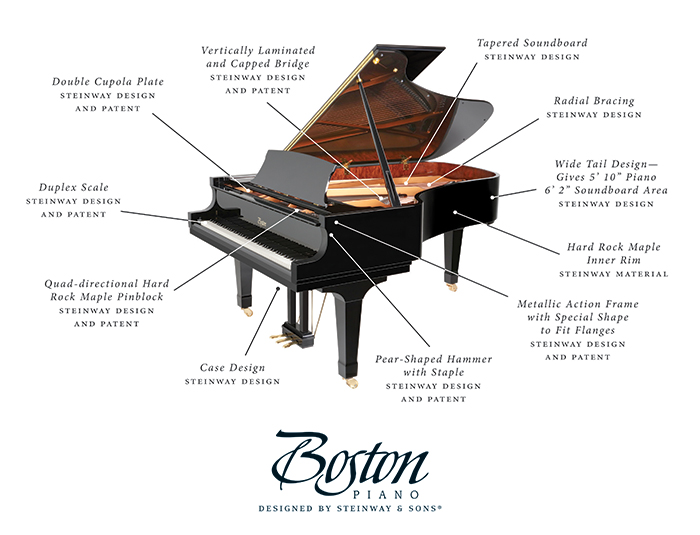fisk university begins a march toward all-steinway with four boston uprights
As seen in the Fall 2018 edition of the Boston Chronicle
NASHVILLE, TN – With a sublime musical legacy requiring nothing less than pianos by Steinway & Sons, Fisk University has added four ebony Boston uprights to its practice rooms and classroom in the Harris Music Building.
Dr. Philip Autry, Music Discipline Coordinator, sees the new instruments as a harbinger of things to come when Fisk transitions to a growing group of All-Steinway Schools in Tennessee.
A historically black liberal arts university founded in 1866, Fisk is in the midst of a $2 million All-Steinway campaign to replace its pianos. “We considered our options for the small spaces in our practice rooms and classroom, and decided that the Bostons represented the best fit and the best value,” Dr. Autry said. “Although we took care of the previous equipment, those pianos were 25 years old and would no longer hold a tune. They had sluggish actions and the worst tonal qualities. Because maintenance funds were allotted with the most recent acquisition, we can keep these new pianos in tune longer. The Boston uprights have great actions and produce great sounds,” he added.
Dr. Autry worked closely with Robert Klingbeil, Director of Institutional Sales at Steinway Piano Gallery Nashville, and generous donors financed the replacement of the practice pianos.
“While we still need to replace our grand pianos, the All-Steinway campaign is about providing the very best instruments for the Fisk community, an endowment to ensure that they are taken care of, and money for music scholarships. The Bostons present a much more positive environment for our students as they prepare for classes and lessons, and the Steinway grands we will eventually purchase will impact the entire community since they will be used for instruction, convocations, chapel services, receptions, concerts and the like,” Dr. Autry said.
Students, faculty and alumni greeted the new Bostons when they arrived on campus in November. “Words can’t express how excited I am,” said 2010 alumna Kaylina Crawley. “These pianos will encourage students and give them a chance to practice on new equipment and enhance their performance.”
Music – in particular, the valiant efforts of the Fisk Jubilee Singers – rescued the university during a difficult post-Civil War reconstruction. To serve those freed from slavery, Fisk held classes in an abandoned Union Army barracks but struggled due to lack of finances. The Jubilee Singers, including seven former slaves, embarked on an unauthorized fund-raising tour. The A Capella ensemble performed classical music, but on Nov. 15th, 1871, offered a spiritual before a convention of the National Council of Churches in Oberlin, Ohio.
“They sang ‘Steal Away to Jesus’ that night with the heart and soul of an oppressed people and conveyed the message of human emotion,” former Fisk President Henry Ponder told The Los Angeles Times in 1986. Abolitionist Henry Ward Beecher would become a chief patron and the Singers went on to perform in New York and New England. Proceeds from the concerts were used to purchase 45 acres of land that now forms the campus of Fisk University.
The university has produced many outstanding artists, some of whom broke color barriers in the 1940s and 50s. Helen L. Phillips, a lyric-dramatic soprano preceded Marian Anderson as the first African-American singer known to have appeared with the Metropolitan Opera Chorus in 1947, according to The New York Times. Baritone Robert K. McFerrin holds the distinction of being the first African-American man to sing at the Met. He was the father of Grammy-award winning singer Bobby McFerrin.
Anderson’s friend, Ann Gamble Kennedy, graduated from Fisk in 1941 and pursued further studies at the Oberlin Conservatory of Music and the Juilliard School. She taught at her alma mater and served as long-time accompanist and piano soloist. Tenor Roland Hayes joined the group in 1911 and became a world-renowned concert artist.
“This is only the beginning,” Dr. Autry said, envisioning the day when students are positioned for even greater achievements at an All-Steinway School.
the piano with Steinway DNA
Whether dazzling at the concert hall, woodshedding in the practice room, or exploring the joy of music at home, the Steinway-designed Boston brings the genuine world-class tone and responsiveness within reach.
